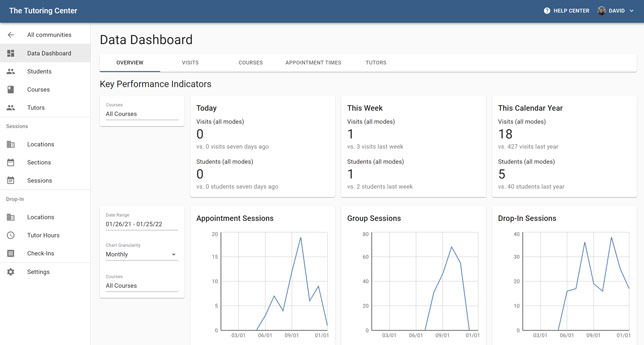Mobile Platform Connects Students to Services and Support
Peer tutoring platform Penji has released Penji Student Support, a tool for connecting students to advisers, mentors, tutors, coaches and counselors via mobile app. The new platform provides students with a single place to find services, master academic material, gain emotional support and more.
The app can be organized into customized "communities," designed to meet the diverse needs of tutoring, advising, coaching, supplemental instruction, financial aid, mentoring, career counseling and more. Students can search for support options across communities, schedule appointments, receive reminders, engage with services and provide feedback.
An administrative dashboard provides insights into student behavior and their interactions with different support centers, collecting data from across the campus and consolidating it into a single view. For example, aggregated datasets including student GPAs allow program administrators to correlate support usage with impact, the company said in a news release. The app also enables administrators to view integrated student histories, share notes and refer students to relevant service centers.

Penji's administrative dashboard
"Working with Penji Student Support has allowed us to streamline the operations of nine different support centers," said Kelli Listenbee, director of learning support services at Arkansas State University, in a statement. "While this has been great for students, the uniform format data has also made it easy for us to analyze impact on persistence for each program."
"Penji has allowed us to streamline our Peer Education services while being very easy for students to access," commented Sarah Cramer, coordinator of peer education for the Division of Academic Enhancement at the University of Georgia. "The platform is very easy to navigate and the admin tools are remarkable. The data Penji provides allows us to make quick adjustments and adapt based on students' needs in real time. We exceeded all-time high appointment counts by over 100% during COVID in our first year with Penji."
"At a time when universities are seeking new ways to engage students, create more value and improve their learning experiences, we're excited to expand into campus-wide support with our popular mobile-first technology," said Ben Holmquist, co-founder and CEO of Penji. "Penji Student Support gives administrators a clear picture of student usage across campus centers with actionable insight to improve student service and analyze investment in programs."
For more information, visit the Penji site.
About the Author
Rhea Kelly is editor in chief for Campus Technology, THE Journal, and Spaces4Learning. She can be reached at [email protected].